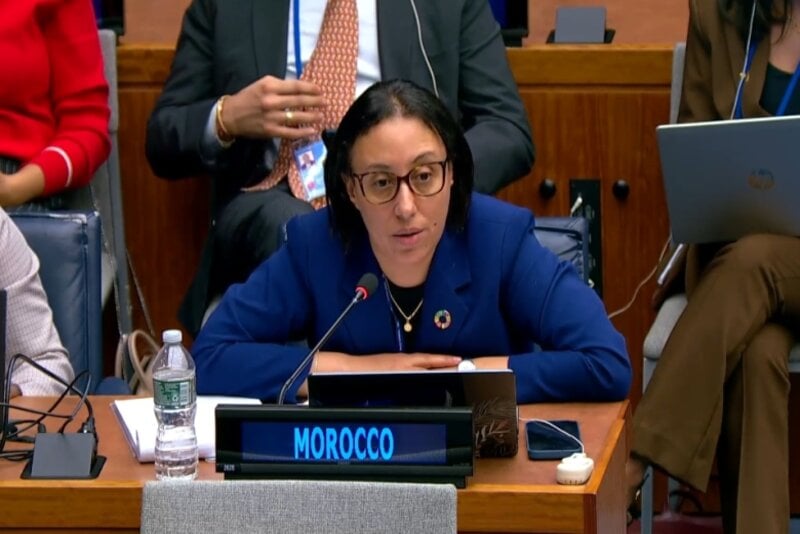
The Moroccan Deputy Permanent Representative to the United Nations, Majda Moutchou, has condemned what she described as "flagrant and selective double standards" used by Algeria's representative at the UN concerning the extension of MINURSO's mandate to incorporate a human rights aspect. She accused them of engaging in "selective political manipulation."
“A single delegation out of all those that participated in this debate was the sole one to address the aspect of human rights and attempted to connect it with MINURSO,” stressed the Moroccan diplomat as a reaction to the Algerian ambassador’s comments made on Monday during an open discussion held by the Security Council aimed at enhancing the flexibility of United Nations peacekeeping missions.
She highlighted that Morocco's delegation was taken aback and amazed by this intervention, describing it as "a prime example of selective political manipulation." She also mentioned that the Algerian ambassador has unexpectedly developed a strong interest in human rights and international law.
Illuminating the speaker about "facts that are deliberately overlooked or selectively forgotten," the diplomat emphasized that MINURSO's mandate is unambiguous—it was set up by the Security Council to monitor the truce.
"This has been explicitly outlined by the Security Council, and any effort by the Algerian delegation to misconstrue its function is either based on misinformation or an intentional misrepresentation," she emphasized, further stating that unlike claims made elsewhere, only four out of eleven United Nations peacekeeping missions possess human rights monitoring assignments.
"We also question why the Algerian delegation chooses to focus solely on MINURSO with clear and selective double standards, while ignoring other peacekeeping missions?" asked the diplomat.
Morocco’s Deputy Permanent Representative to the United Nations also emphasized that the Security Council establishes these mandates according to the particular circumstances present. "This is not a standard practice or an anomaly; rather, it is determined individually for each scenario."
Moreover, even with the continuous and urgent efforts made by this particular delegation, back in October 2024, the Security Council unanimously declined to incorporate a human rights oversight body into MINURSO’s mission mandate. This decision was intentional; it underscored that the state of human rights within the Moroccan Sahara doesn’t necessitate such an entity," she emphasized. "This sends a definitive signal that the Council can see past the strategically orchestrated tactics employed by some factions.
Continuing her rebuttal to the Algerian ambassador’s remarks expressing such deep concern over human rights issues, Ms. Moutchou confronted him regarding "an even more urgent issue: the Tindouf camps situated within their borders, where people endure constant repression, have their basic rights denied, and face stringent limitations on their movements—all clear breaches of international law."
In contrast, the diplomat emphasized that Morocco has repeatedly shown its steadfast dedication to advancing human rights and protecting the basic rights and liberties of every individual. They noted specifically that the country has continually cooperated with the Special Procedures of the United Nations Human Rights Council.
She mentioned that Morocco has welcomed multiple visits from UN specialists and has worked collaboratively to enhance openness, communication, and advancement. Furthermore, she emphasized that Morocco's initiatives for advancing human rights consist of tangible steps rather than just rhetoric, all directed towards safeguarding the welfare and respect of each individual under its governance.
In response to the comments made by the Algerian ambassador regarding the right to self-determination, the diplomat highlighted a "disturbing inconsistency." They pointed out that Algeria views this principle selectively; they use it as a political instrument against Morocco’s territorial sovereignty but overlook it in cases where other populations endure foreign domination and suppression.
“She emphasized that the UN should address all cases equally, without exceptions or biases, even within countries advocating self-determination for others yet consistently withholding it from the people under their control.” She further stated, “Self-determination is not a political instrument to be used arbitrarily—one where it’s granted to some but overlooked for others. It shouldn’t serve as a convenient pawn,” she concluded.
The diplomat ended by emphasizing that "the Sahara has consistently been an intrinsic part of Morocco. It is Moroccan, and it shall remain so perpetually. This assertion does not stem from contemporary events, but rather underscores the deep-rooted historical, cultural, and geographical connections spanning many centuries."
The post Security Council: Morocco Condemns Algerian Ambassador's 'One-Sided Hypocrisy' Regarding the Issue of Western Sahara appeared first on Sport.Bangjo.co.idEnglish - Morocco News .

Our website uses cookies to improve your experience. Learn more